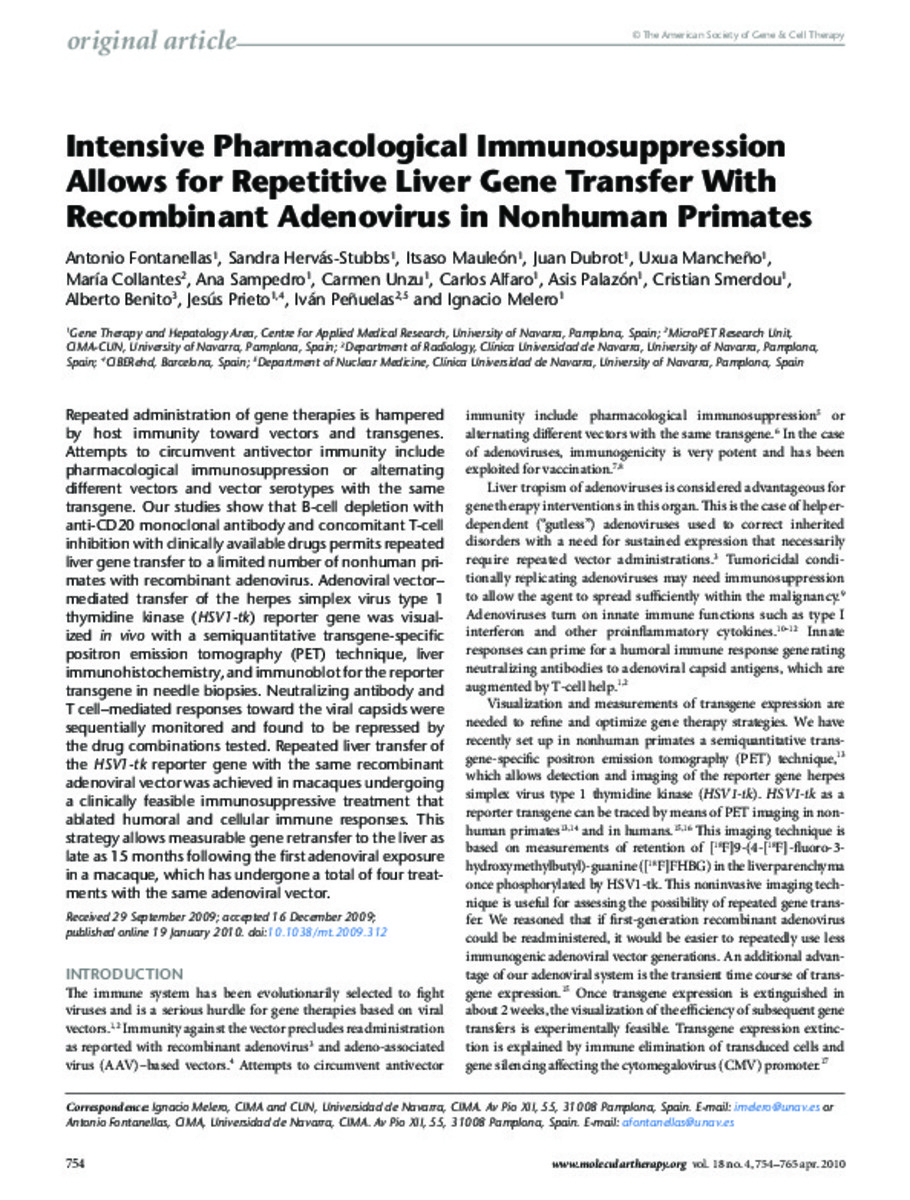Full metadata record
| DC Field | Value | Language |
|---|---|---|
| dc.creator | Fontanellas-Romá, A. (Antonio) | - |
| dc.creator | Hervas-Stubbs, S. (Sandra) | - |
| dc.creator | Mauleon, I. (Itsaso) | - |
| dc.creator | Dubrot, J. (Juan) | - |
| dc.creator | Mancheño, U. (Uxua) | - |
| dc.creator | Collantes, M. (María) | - |
| dc.creator | Sampedro, A. (Ana) | - |
| dc.creator | Unzu, C. (Carmen) | - |
| dc.creator | Alfaro, C. (Carlos) | - |
| dc.creator | Palazon, A. (Asís) | - |
| dc.creator | Smerdou, C. (Cristian) | - |
| dc.creator | Benito-Boilos, A. (Alberto) | - |
| dc.creator | Prieto, J. (Jesús) | - |
| dc.creator | Peñuelas-Sanchez, I. (Ivan) | - |
| dc.creator | Melero, I. (Ignacio) | - |
| dc.date.accessioned | 2010-10-19T07:28:43Z | - |
| dc.date.available | 2010-10-19T07:28:43Z | - |
| dc.date.issued | 2009-12-16 | - |
| dc.identifier.citation | Fontanellas A, Hervas-Stubbs S, Mauleon I, Dubrot J, Mancheno U, Collantes M, et al. Intensive pharmacological immunosuppression allows for repetitive liver gene transfer with recombinant adenovirus in nonhuman primates. Mol Ther 2010 Apr;18(4):754-765. | es_ES |
| dc.identifier.issn | 1525-0016 | - |
| dc.identifier.uri | https://hdl.handle.net/10171/13518 | - |
| dc.description.abstract | Repeated administration of gene therapies is hampered by host immunity toward vectors and transgenes. Attempts to circumvent antivector immunity include pharmacological immunosuppression or alternating different vectors and vector serotypes with the same transgene. Our studies show that B-cell depletion with anti-CD20 monoclonal antibody and concomitant T-cell inhibition with clinically available drugs permits repeated liver gene transfer to a limited number of nonhuman primates with recombinant adenovirus. Adenoviral vector–mediated transfer of the herpes simplex virus type 1 thymidine kinase (HSV1-tk) reporter gene was visualized in vivo with a semiquantitative transgene-specific positron emission tomography (PET) technique, liver immunohistochemistry, and immunoblot for the reporter transgene in needle biopsies. Neutralizing antibody and T cell–mediated responses toward the viral capsids were sequentially monitored and found to be repressed by the drug combinations tested. Repeated liver transfer of the HSV1-tk reporter gene with the same recombinant adenoviral vector was achieved in macaques undergoing a clinically feasible immunosuppressive treatment that ablated humoral and cellular immune responses. This strategy allows measurable gene retransfer to the liver as late as 15 months following the first adenoviral exposure in a macaque, which has undergone a total of four treatments with the same adenoviral vector. | es_ES |
| dc.language.iso | eng | es_ES |
| dc.publisher | NATURE PUBLISHING GROUP | es_ES |
| dc.rights | info:eu-repo/semantics/closedAccess | - |
| dc.subject | Intensive Pharmacological | es_ES |
| dc.subject | Immunosuppression | es_ES |
| dc.subject | Allows for Repetitive | es_ES |
| dc.subject | Liver Gene Transfe | es_ES |
| dc.subject | Recombinant Adenovirus | es_ES |
| dc.subject | Nonhuman Primates | es_ES |
| dc.title | Intensive pharmacological immunosuppression allows for repetitive liver gene transfer with recombinant adenovirus in nonhuman primates | es_ES |
| dc.type | info:eu-repo/semantics/article | es_ES |
| dc.identifier.doi | http://dx.doi.org/10.1038/mt.2009.312 | es_ES |
Files in This Item:
Statistics and impact
Items in Dadun are protected by copyright, with all rights reserved, unless otherwise indicated.






